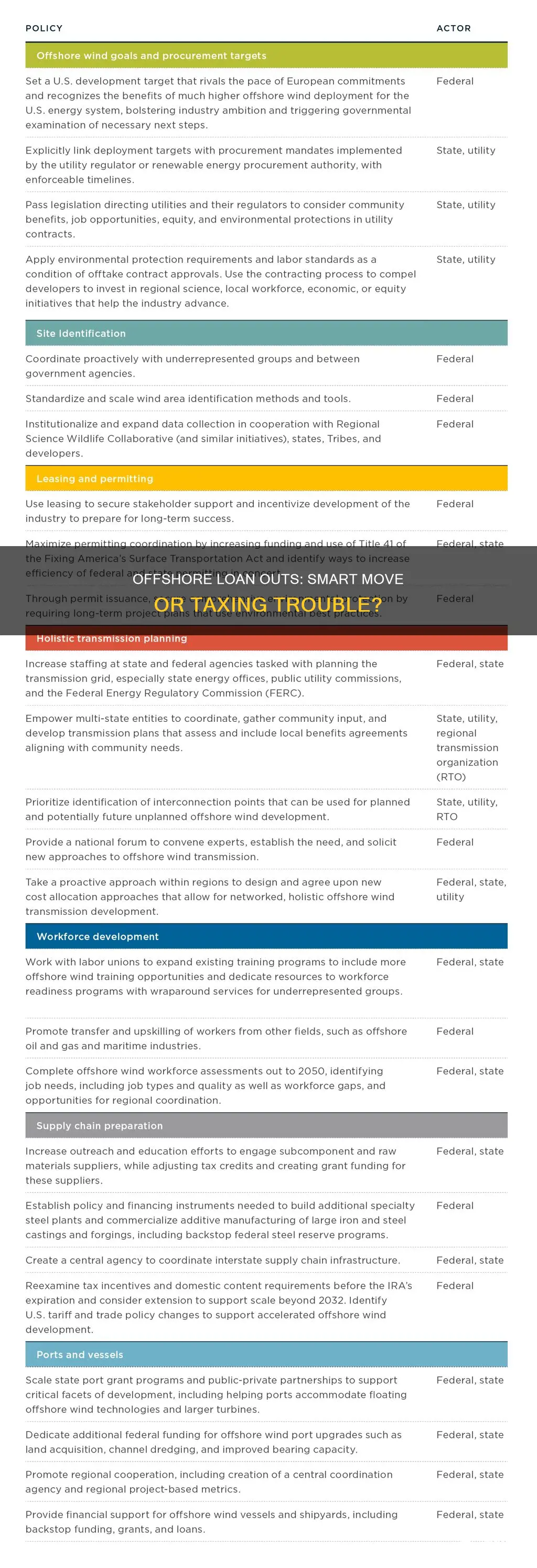
Taking out a loan from an offshore bank is an increasingly appealing option for many borrowers. The benefits of doing so include greater privacy and confidentiality, a wider range of loan types, and potentially lower interest rates. Furthermore, offshore loans can be obtained in a range of currencies, which can be advantageous depending on the lending terms of the loan. However, critics argue that offshore loans can be used to hide tax liabilities or engage in illicit activities. The application process for an offshore loan is also more meticulous and requires borrowers to submit a comprehensive set of documents.
| Characteristics | Values |
|---|---|
| Definition | Offshore refers to a location outside of one's home country, often an island nation, where entities set up corporations, investments, and deposits. |
| Types | Business, investing, and banking. Offshoring is often referred to as outsourcing in the context of business activity. |
| Benefits | Privacy and confidentiality, tax advantages, protection against local political or financial instability, diverse loan options, and potentially lower interest rates. |
| Drawbacks | Perceived association with illicit activities, money laundering, tax evasion, and fraud. May be less financially secure than domestic banks. |
| Considerations | Loan restrictions, currency choice, application requirements, and tax obligations. |
What You'll Learn

Privacy and confidentiality
Historically, Swiss banks didn't even attach names to accounts, but Switzerland has since agreed to turn over information to foreign governments on their account holders, effectively ending tax evasion associated with unreported or hidden accounts. In 2023, 108 countries automatically shared information about offshore accounts with tax authorities, disclosing 123 million accounts worth more than €12 trillion.
Some offshore jurisdictions have provisions that enable them to ensure the identities of company owners, shareholders, and directors are kept confidential. For example, Nevis allows limited liability corporations to maintain anonymity and confidentiality. The Cook Islands International Trusts Act was enacted in 1984, creating the first laws providing people with asset protection. It has since been amended several times to enhance privacy and strengthen asset protection.
While offshore banking can be used for legitimate reasons, such as asset protection, investment, and privacy, it becomes illegal when used for money laundering, tax evasion, or hiding income and assets. Due to the historical association of offshore accounts with tax avoidance and illegal activity, these accounts are typically under government scrutiny. It is important to always report all offshore accounts to the relevant tax authorities and comply with all tax and reporting laws.
Interest Rates: Fluctuating Throughout the Life of a Loan?
You may want to see also

Tax advantages
The term offshore refers to a location outside of one's home country. It is commonly used in the banking and financial sectors to describe areas with different regulations from the individual's or company's home country.
Offshore banking can provide several tax advantages, particularly for businesses and high-net-worth individuals. Here are some key tax advantages:
- Tax-efficient Structure: Offshore business structures are often set up in tax-advantaged jurisdictions. For example, a self-employed individual can establish a corporation in a country with lower tax rates, receive their income and pay expenses through this company, and then pay themselves a salary, often utilising the Foreign Earned Income Exclusion (FEIE). This salary, paid by a non-US entity, is typically exempt from self-employment taxes, reducing federal tax liabilities.
- Deferral of Taxation: Profits generated overseas by multinational corporations may benefit from a provision known as "deferral." This allows such profits to accumulate indefinitely, sometimes without being subject to taxation. This practice can result in significant tax savings for corporations, although it also leads to a loss of federal tax revenue for the US government.
- Lower Tax Rates: Offshore jurisdictions often have lower tax rates than an individual's or company's home country. For instance, choosing a loan in Swiss Francs from an offshore bank may result in a lower interest rate, benefiting the borrower.
- Tax Avoidance: While controversial, offshore structures can facilitate tax avoidance. Critics argue that offshore entities help hide tax liabilities or illicit gains from authorities, despite most countries requiring the reporting of foreign holdings. However, the use of complex structures and favourable tax laws in certain jurisdictions enables individuals and corporations to minimise their tax obligations.
While offshore loan outs can provide tax advantages, it is important to recognise that they also come with increased complexity, stricter documentation requirements, and potential challenges in maintaining compliance with regulatory authorities.
Helco Modification: Does ICCU Provide Loan Options?
You may want to see also

Range of currency options
When it comes to offshore loans, there are a variety of currency options to choose from. This is because offshore loans are offered by offshore banking units (OBUs), which are financial institutions located in various jurisdictions around the world. This means that borrowers can access a range of foreign currencies, which can provide several benefits.
One advantage of the range of currency options available with offshore loans is the potential to benefit from lower interest rates. Certain currencies, such as the Swiss Franc, may offer lower interest rates compared to others. By choosing the right currency, borrowers can secure more favourable lending terms.
Additionally, the ability to borrow in different currencies allows borrowers to take advantage of exchange rate fluctuations and potentially reduce currency risks. This can be especially beneficial for individuals or businesses with international operations or investments.
However, it is important to carefully consider the potential risks associated with borrowing in a foreign currency. Currency fluctuations and regulatory changes can impact the overall cost and feasibility of the loan. Geopolitical instability and differences in regulatory requirements between jurisdictions are also crucial factors to keep in mind.
Overall, the range of currency options available with offshore loans provides borrowers with flexibility and the potential for favourable terms. However, it is essential to thoroughly assess the risks and complexities involved before proceeding with an offshore loan.
Illinois and the US Rule Loan: What You Need to Know
You may want to see also

Lending restrictions
When seeking an offshore loan, it is important to choose a suitably regulated jurisdiction. Belize, for example, has several regulations in place to protect borrowers. The International Financial Services Commission of Belize ensures that loans are only offered by official companies in Belize, that lenders have to prominently disclose terms before signing, and that undesirable collection practices are banned.
It is also important to be aware of each country's local remittance restrictions. For example, China has significant restrictions on outbound capital from the country.
The application process for an offshore loan is harder and more meticulous. Offshore lending institutions will require different sets of documents to ensure that the borrower has the ability to pay the loan. These documents may include proof of funds in a bank account, proof of identity, and proof of residence. Corporate loans will require more documents than personal loans.
It is also important to carefully consider the currency in which the loan will be borrowed. In many countries, loans are only available in the domestic currency, but offshore banks that cater to international investors and account holders may provide more diversity. The currency chosen will affect the lending terms of the loan. For example, choosing Swiss Francs might give a lower interest rate, which would be more favorable for the borrower.
HR Block: Quick Refund Loans and Advances for Tax Filers
You may want to see also

Application process
The first step in applying for an offshore loan is to determine the exact amount you need to borrow. It is important to note that offshore lending is not exclusive to the very wealthy or those with large international corporations. Many borrowers take out loans for various purposes, such as paying for higher education, accessing capital for investments, or purchasing an international vacation home.
Next, you should understand the different types of financing available and select the right type of loan for your needs. Consider whether you require a corporate or personal loan. Corporate lending options may include commercial secured credit loans, working capital, or real estate loans. On the other hand, personal financing options might encompass remodelling loans, real estate purchase loans, or construction loans.
After deciding on the loan amount and type, you can choose the currency in which you want to borrow. Unlike domestic loans, offshore loans offer a choice of currencies, including U.S. Dollars, Swiss Francs, British Pounds, or Euros. The currency you select can impact the lending terms of your loan, with certain currencies offering lower interest rates. For example, borrowing in Swiss Francs may result in a more favourable loan due to lower interest rates.
Once you have determined the loan amount, currency, and type, you can proceed to choose the specific lender or offshore bank. It is advisable to select a country with laws favourable to foreign investors and a bank with a strong reputation, additional complementary services, and good communication.
Finally, start preparing the required documents for the loan application. Offshore lending institutions typically require a comprehensive set of documents due to the cross-border nature of the transaction. These documents may include proof of funds, proof of identity, and proof of residence. Corporate loans usually necessitate more extensive documentation than personal loans. Ensure that you have all the required documents and that you are confident in your ability to repay the loan before formally applying.
Understanding Interest Accrual on Unsubsidized Loans
You may want to see also
Frequently asked questions
An offshore loan is a loan from a bank in a country you don't reside in.
Offshore loans can provide a range of benefits, including:
- A wide variety of loan types
- Interest rates that may be more favourable
- A choice of currencies
- Greater privacy and security
- Tax advantages
- Protection from political shifts
Offshore loans can be harder to apply for and may have stricter requirements. They may also carry additional fees and charges.
First, determine the type of loan (personal or corporate), the amount, the currency and the bank. Then, gather the necessary documents, such as proof of funds, identity and residence. Finally, submit your application, ensuring you meet all the requirements.
There are many countries and banks to choose from for an offshore loan. Look for a country with laws favourable to foreign investors, such as Belize, and a bank with a good reputation that offers the services you need.







